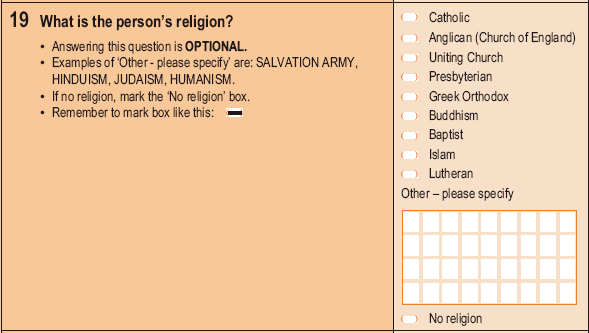RELIGIOUS AFFILIATION
JUSTIFICATION
Religious organisations are the largest providers of services to the community outside those provided by governments, and the Census is the only source of religious affiliation data for effective and efficient services planning.
Information on religious affiliation is widely used in the religious community, and by government agencies that provide services complementary to those provided by religious organisations.
HISTORICAL INFORMATION
A question on a person’s religion has been asked in all Censuses. The Census and Statistics Act 1905 specifies that response to this question is optional. Despite the optional nature of the religion question, approximately 90% of respondents provided an answer in 2006.
USER REQUIREMENTS
Data on the religious affiliations of the population are required for planning the extensive range of activities and services involving religious organisations, including:
- education facilities, aged persons care, other social services and location of places of worship
- the allocation of chaplains to hospitals, prisons and the armed services
- the accreditation of marriage celebrants
- the allocation of government grants to non-government schools and religious groups, sociological research and the allocation of air time on public radio.
Information on a person’s religion is also, to some extent, useful as a surrogate measure of ethnicity.
AVAILABILITY OF NON-CENSUS DATA
Data on the religious affiliations of the population are not available from other sources. However, some data on religion are obtained from marriage registration forms.
2006 CENSUS QUESTION

Response categories included in the religion question are selected according to the frequency of responses reported in the previous Census.
 Print Page
Print Page
 Print All
Print All
 Print Page
Print Page
 Print All
Print All